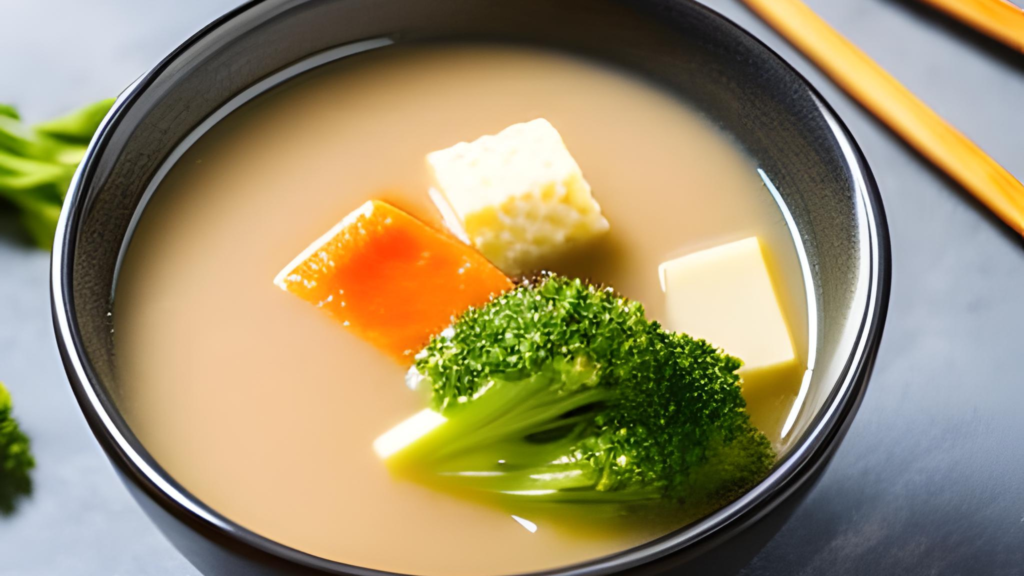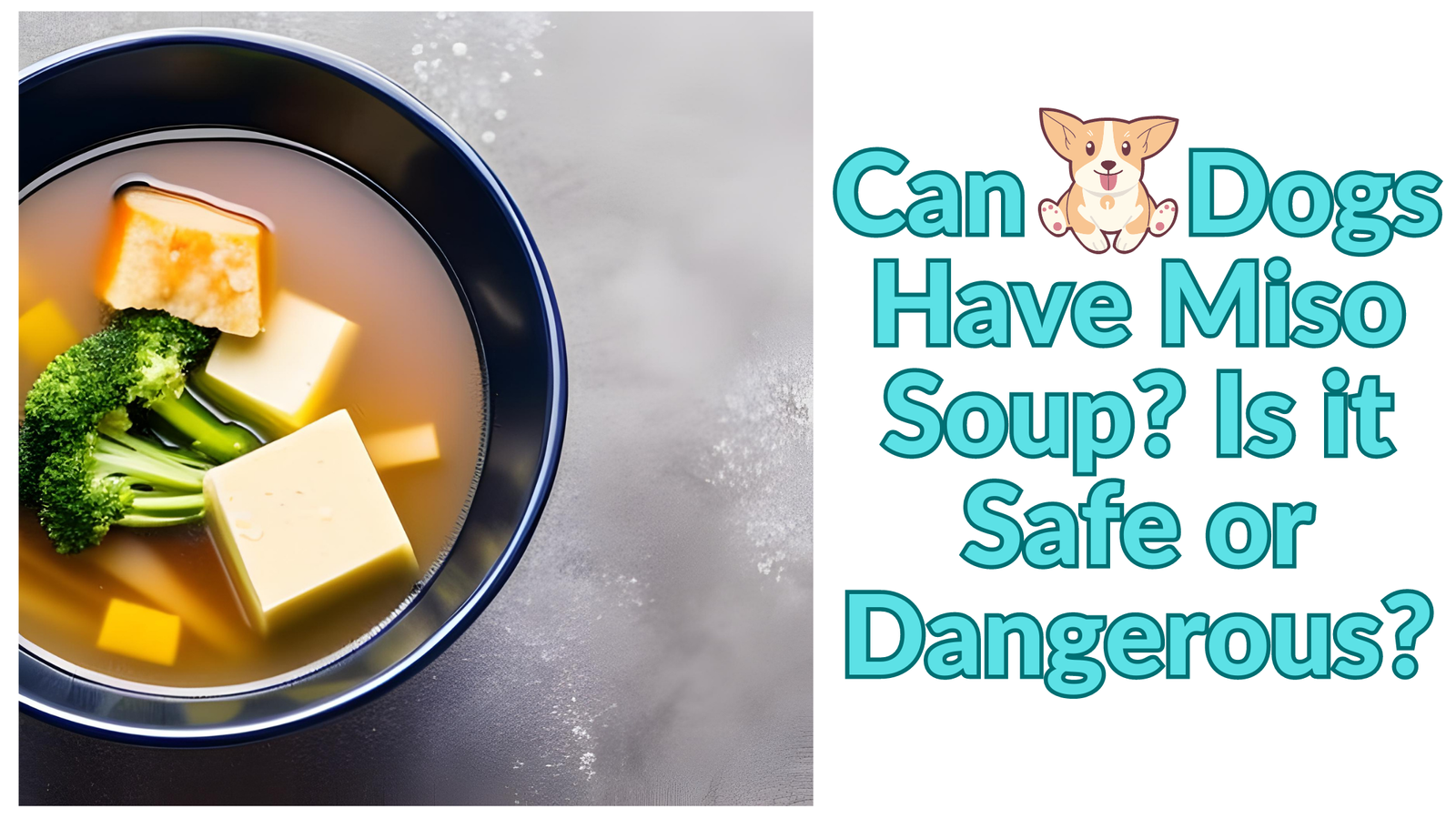Can Dogs Have Miso Soup? – Miso soup is a popular Japanese dish with fermented soybeans, dashi broth, and other ingredients such as tofu and seaweed. It is a nutritious and flavorful soup that is enjoyed by many people around the world.
But as a dog owner, you may wonder if it is safe for your furry friend to consume. In this article, we will explore whether or not dogs can have miso soup and what you need to know to keep your dog healthy and happy.
What is Miso Soup?

Miso soup is a traditional Japanese soup made with dashi broth (a soup stock made from seaweed and bonito flakes) and fermented soybean paste called miso.
The soup is typically made with other ingredients such as tofu, scallions, seaweed, and sometimes meat or fish. It is a staple in Japanese cuisine and is enjoyed for its unique taste and health benefits.
Miso paste is made by fermenting soybeans with salt and a koji fungus. The fermentation process can take several months to a few years, depending on the miso type.
The resulting paste has a savory, salty, and slightly sweet flavor. It is used as a seasoning in many Japanese dishes.
Miso soup is often served as a starter or side dish in Japanese cuisine and is known for its nutritional value.
It is high in protein, fiber, and vitamins and is low in calories and fat. It is also a good source of probiotics, beneficial bacteria promoting gut health.
Also Read : Rattlesnake Vaccine for Dogs: Pros and Cons of Protecting Your Bestie
Is Miso Soup Safe for Dogs to Consume?
While miso soup can be a nutritious and flavorful soup for humans, it is not recommended to feed it to dogs.
Miso soup contains high sodium, which can harm dogs if consumed in large quantities.
Additionally, some of the ingredients used in miso soup, such as onions and garlic, can be toxic to dogs if consumed in large amounts.
It is also important to note that dogs have different digestive systems than humans and may not be able to properly digest certain ingredients found in miso soup.
Some dogs may experience gastrointestinal issues such as diarrhea or vomiting if they consume miso soup or other foods not part of their regular diet.
While miso soup may be safe for dogs to consume in small amounts occasionally, it is not recommended as a regular part of their diet.
It is always best to consult with your veterinarian before introducing any new foods to your dog’s diet to ensure that it is safe for them to consume.
Health Benefits and Risks of Miso Soup for Dogs
As mentioned earlier, miso soup can be a nutritious soup for humans.
Still, it is not recommended to feed it to dogs due to the high amount of sodium and the potential toxicity of some of the ingredients.
However, let’s take a closer look at the potential health benefits and risks of miso soup for dogs:
Health Benefits:
- Miso paste contains probiotics, which are beneficial bacteria that promote gut health. This can be beneficial for dogs with digestive issues or those taking antibiotics, which can disrupt the natural balance of bacteria in the gut.
- Miso paste is also a good source of protein and vitamins, which can benefit dogs. However, it is important to note that other sources of protein and vitamins are better suited for dogs and their dietary needs.
Risks:
- Miso soup contains high sodium, which can harm dogs if consumed in large quantities. Sodium can lead to dehydration and cause electrolyte imbalances in dogs, which can be dangerous.
- Some of the ingredients used in miso soup, such as onions and garlic, can be toxic to dogs if consumed in large amounts. These ingredients can cause damage to the red blood cells, leading to anemia and other health issues.
- Dogs have different digestive systems than humans and may be unable to properly digest certain ingredients found in miso soup. This can lead to gastrointestinal issues such as diarrhea or vomiting.
While miso soup may have some potential health benefits for dogs, the risks associated with consuming it outweigh the benefits.
It is best to avoid feeding dogs miso soup or other human foods and instead provide them with a balanced and appropriate diet formulated for their specific nutritional needs.
Ingredients to Avoid When Feeding Miso Soup to Dogs
Suppose you are considering feeding miso soup to your dog. In that case, it is important to be aware of the ingredients that can be potentially harmful or toxic to them.
Here are some ingredients commonly used in miso soup that you should avoid feeding your dog:
- Onions and Garlic: Both onions and garlic contain compounds that can damage a dog’s red blood cells, leading to anemia and other health issues. Even small amounts of these ingredients can be harmful to dogs.
- Seaweed: While seaweed is generally safe for dogs in small amounts, some types of seaweed used in miso soup, such as hijiki and arame, can contain high levels of arsenic and other toxins that can be harmful to dogs if consumed in large quantities.
- Soy Sauce: Soy sauce contains high sodium, which can harm dogs if consumed in large quantities. In addition, soy products can cause allergic reactions in some dogs.
- Tofu: While tofu is a good source of protein for humans, it can be difficult for dogs to digest and may cause gastrointestinal issues such as diarrhea and vomiting.
- Alcohol: Some miso soup recipes may use sake, a Japanese rice wine containing alcohol. Alcohol can be toxic to dogs and cause various symptoms, including vomiting, diarrhea, and difficulty breathing.
Generally, it is best to avoid feeding dogs miso soup or other human foods and instead provide them with a balanced and appropriate diet formulated for their specific nutritional needs.
If you are trying to decide whether a certain food is safe for your dog to eat, consult your veterinarian.
How to Safely Feed Miso Soup to Your Dog
While feeding miso soup to your dog is not recommended, if you do choose to do so, it is important to take certain precautions to ensure your dog’s safety and well-being.
Here are some tips for safely feeding miso soup to your dog:
- Please consult with your veterinarian: Before feeding miso soup or any other human food to your dog, it is important to consult with your veterinarian to ensure that it is safe and appropriate for your dog’s individual health needs.
- Use plain miso paste: When making miso soup for your dog, use plain miso paste without added ingredients like onions, garlic, or alcohol. You can also make your own miso paste at home using safe ingredients.
- Keep portions small: Dogs have different nutritional needs than humans, and miso soup should not be a significant part of their diet. Offer your dog a small amount of miso soup as a treat or supplement to their regular diet.
- Monitor your dog’s reaction: After feeding miso soup to your dog, monitor their reaction closely for any signs of digestive upset or allergic reactions. If your dog experiences vomiting, diarrhea, or other symptoms, stop feeding them miso soup and consult with your veterinarian.
- Avoid store-bought miso soup: Store-bought miso soup may contain additional ingredients harmful to dogs, such as seaweed or soy sauce. Making miso soup for your dog at home best uses safe and simple ingredients.
It is important to remember that miso soup should not be a regular part of your dog’s diet and should only be fed in moderation as an occasional treat.
Please consult your veterinarian before feeding your dog any human food to ensure their safety and well-being.
Alternative Foods for Dogs to Enjoy

While miso soup may not be the best choice for your dog, plenty of other human foods can be safely and healthily incorporated into their diet.
Here are some alternative foods for dogs to enjoy:
- Lean meats: Dogs are primarily carnivorous and require a protein-rich diet. Lean meats such as chicken, turkey, and beef are excellent protein sources for dogs.
- Vegetables: Many vegetables are safe and healthy for dogs to eat. Carrots, green beans, sweet potatoes, and peas are all good choices.
- Fruits: Fruits like apples, bananas, and blueberries are nutrient-rich and can make a tasty and healthy dog treat.
- Eggs: Eggs are a good source of protein and healthy fats for dogs. They can be cooked and served as a meal or added to your dog’s food.
- Plain yogurt: Plain yogurt is a good source of probiotics and can help promote digestive health in dogs.
- Peanut butter: Peanut butter is a popular dog treat and can be a good source of protein and healthy fats. However, choosing a brand that does not contain xylitol, a sweetener that can be toxic to dogs, is important.
When feeding human food to your dog, it is important to remember to do so in moderation and consult with your veterinarian to ensure that it is safe and appropriate for your dog’s individual health needs.
Also Read : Alfalfa Pellets for Dog Litter: Best Guide 2023
Frequently Asked Questions About Dogs and Miso Soup
Here are some frequently asked questions about dogs and miso soup:
Can Dogs Have Miso Paste?
Miso paste is made from fermented soybeans and is a common ingredient in Japanese cuisine.
While it may be safe for dogs to consume small amounts of miso paste, it is generally not recommended to feed it to them.
Miso paste is high in sodium, which can greatly harm dogs. Consuming too much sodium can lead to dehydration, electrolyte imbalances, and other health issues.
Additionally, miso paste often contains other ingredients like garlic, onions, and chives that are toxic to dogs and should be avoided.
If you want to incorporate fermented foods into your dog’s diet, there are safer options, such as plain yogurt or kefir.
As with any new food, it’s important to introduce it slowly and in small amounts to avoid upsetting your dog’s stomach.
In summary, while miso paste may not be toxic to dogs in small amounts, it is best to avoid feeding it to them due to its high sodium content and potential for harmful ingredients.
How Much Miso Soup Can a Dog Eat?
The amount of miso soup a dog can eat depends on the dog’s size and overall health.
Generally, dogs should not consume more than 10% of their daily caloric intake from treats and other non-nutritional foods.
It’s also important to consider the sodium content of the miso soup, as excessive sodium intake can lead to dehydration, electrolyte imbalances, and other health problems.
A small amount of miso soup as an occasional treat is unlikely to cause harm to most dogs.
However, it’s important to monitor your dog’s response to the miso soup and adjust their diet as needed.
Suppose your dog has any health conditions or dietary restrictions. In that case, it’s best to consult your veterinarian before feeding them miso soup or other non-standard food.
Can Cats Have Miso Soup?
While there is no harm in giving small amounts of miso soup to your cat, it is not recommended to make it a regular part of their diet.
Cats have different nutritional requirements than dogs and humans, and miso soup may not provide them with the necessary nutrients.
Additionally, some cats may react adversely to certain ingredients in miso soup, such as soy or seaweed.
Ask your veterinarian before giving your cat miso soup or human food is best.
Can Dogs Eat Miso Salmon?
While salmon can be a healthy addition to a dog’s diet due to its high protein and omega-3 content, miso salmon should be avoided.
Miso salmon typically contains ingredients that may not be suitable for dogs, such as soy sauce, sugar, and garlic.
These ingredients can harm your dog’s health and cause digestive upset, vomiting, or diarrhea.
If you want to give your dog salmon, it is best to cook it plain without any added seasonings or sauces.
Additionally, remove all bones before serving them to your dog.
Can miso soup be toxic to dogs?
Miso soup is not toxic to dogs, but certain ingredients, such as garlic and onions, can harm dogs.
Can dogs digest miso soup?
Dogs can digest miso soup, but it is not recommended to feed it regularly due to its high sodium content.
What should I do if my dog accidentally eats miso soup?
If your dog accidentally eats miso soup, monitor them closely for signs of digestive upset or other symptoms.
Contact your veterinarian if you notice any adverse symptoms.
Can miso soup help my dog’s health?
While miso soup is not necessarily beneficial for dogs, some ingredients, such as tofu and seaweed, can provide some health benefits in moderation.
However, ask your veterinarian before introducing new foods to your dog.
Can miso soup be used to hydrate dogs?
Miso soup is not a good choice for hydrating dogs as it is high in sodium and can dehydrate them further. Water is the best choice for keeping your dog hydrated.
Final Thoughts: Can Dogs Have Miso Soup?
In conclusion, dogs can have miso soup in moderation if it does not contain harmful ingredients such as garlic or onions.
Miso soup can provide some health benefits due to its ingredients, like tofu and seaweed. Still, it should not be a regular part of your dog’s diet due to its high sodium content.
It is always best to consult with a veterinarian before introducing new foods to your dog to ensure that it is safe and appropriate for their needs.
Remember to feed miso soup in moderation and watch out for any potential digestive issues or allergic reactions in your dog.
